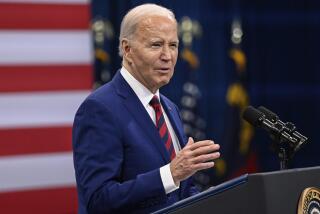Holding New Hampshire’s primary in place
Concord, N.H. — BILL Gardner was at it again, mucking up Democrats’ timetable for picking their presidential nominee by insisting on the date he wanted for New Hampshire’s vote.
So one day, frustrated party leaders sent an emissary to the state Capitol to deal with the balky secretary of state. Gardner, however, would not bend. He was adamant about preserving New Hampshire’s first-in-the-nation primary by pushing the contest forward a week, rather than have it share its election day with Vermont.
The result was a lecture that still rings in his ears nearly 25 years later: You’re a young man and probably hope for a bright political future. If you do this, you will never be elected to another office.
The party’s emissary, Nancy Pelosi, was right. She went on to much bigger things (and can’t recall the conversation). Gardner, 58, is still in the same office — and utterly delighted at life’s fortune. And why not? Gardner is probably the most influential figure in national politics you’ve never heard of.
He is the one and only person in New Hampshire with the power to schedule the state’s presidential primary. It has been first since 1920, making the vote a signal event on the national political calendar — and giving voters of this tiny state an enormous say every four years in deciding who sits in the White House.
It has been Gardner’s mission, his obsession, since 1976 to preserve the state’s preeminence, and nothing — not lobbying, not threats, not even the occasional flicker of self-doubt — can dissuade him from doing whatever it takes to make sure New Hampshire’s primary always, always comes first. (By mutual understanding, Iowa holds the first caucuses, eight days beforehand.)
“What’s been established as a tradition is a tradition,” Gardner says with a certitude as plain and simple as the peanut-butter-on-whole-wheat sandwiches he packs in his brown-bag lunch.
This does not go over well outside the state. Politicians elsewhere perennially complain about the outsize influence of voters in this far-off corner of the country, who reward the top finishers with an important burst of momentum. They hatch plans to diminish New Hampshire’s sway. The latest calls for a Democratic caucus in Nevada three days prior and New Hampshire sharing its primary day, tentatively set for Jan. 22, with Republicans in Wyoming.
Privately, people use the words “stubborn” and “arrogant” to describe Gardner and his insistence on keeping his state’s privileged position, saying he treats it like a God-given right.
But Gardner ignores outsiders. “Nobody’s going to protect New Hampshire but New Hampshire,” he says unapologetically. The state’s small size and proficiency at running elections means he can stall until there is no choice but to let the Granite State go first. One year he waited until almost Christmas to schedule the primary. This time, with the nominating calendar even more front-loaded, he has threatened to hold the 2008 vote in 2007.
That makes Gardner — or Billy, as he is widely known — extremely popular in his native New Hampshire. He is in his 16th two-year term, making him the second-longest-serving secretary of state in the nation’s history. Lawmakers elect him and have kept him there, even though Gardner is a Democrat and, until last month, Republicans ran the Legislature.
He even survived the 1984 Reagan landslide, besting the head of the state GOP at a time when Republicans held 300 of 400 seats in the lower chamber and 18 of 24 state Senate seats.
“He’s one of the most trusted people in state government, in a place where you don’t throw that word around,” said Tom Rath, a Concord attorney and one of the state’s Republican elders.
THOSE who know the unassuming Gardner smile at his fearsome reputation outside New Hampshire. He is a political animal — the sort who drops the 1916 presidential race into casual dinner conversation — but one who tends toward hibernation. He usually eats lunch at his desk, goes home nights to read history (most recently “The Americanization of Benjamin Franklin”) and prides himself on shunning political events.
A tall, bald man with bulging blue eyes, Gardner takes a utilitarian approach to dress: button-down shirts, dark slacks, nondescript ties, and a parka instead of sport coat when it is cold. His home in Manchester, about a half-hour commute from the Capitol, is a weathered two-story Colonial he designed himself.
He has never held a fundraiser or accepted a campaign contribution; when an old friend, a retired GOP lawmaker, started knitting him sweater vests, Gardner insisted on paying for the yarn.
He cringes at personal questions — his two children are grown; one teaches in Hawaii, the other works at the state archives — and, rare for someone in politics, insists on his unimportance. Rummaging through his cramped office on the second floor of the Capitol, Gardner produces a recent copy of Business NH Magazine, and triumphantly notes his name is nowhere on its list of New Hampshire’s “10 Most Powerful People.”
“He’s basically a bureaucrat,” state Sen. Steve Vaillancourt, a Republican turned independent, teases as Gardner leads a guest on a private Capitol tour. “A paper pusher.” At that Gardner laughs, the high pitch echoing off the marble columns and glass cases filled with Civil War battle flags.
It is history, not celebrity, that animates Gardner — again to the point of obsession. He spent years researching obscure footnotes to the 1832 Democratic National Convention, to uncover New Hampshire’s role in triggering that first party gathering. Another time he spent hours wandering Mount Vernon, George Washington’s estate, searching for the tree that yielded the nut that produced a large black oak on the grounds of the New Hampshire Capitol. Gardner gave up, but only temporarily. “It was winter,” he says. “I haven’t gone back when the leaves were out.”
HE didn’t plan a career in politics. Gardner loves animals — raising chickens in the backyard has been a lifelong hobby — and he majored in zoology at the University of New Hampshire. Fraternity brothers persuaded him to run for senior class president, so they would know someone in the race. Gardner won and soon plunged into the maelstrom of Vietnam-era politics. There were campus controversies over the war and the president’s choice for commencement speaker. (Students prevailed and were ushered into adulthood by Democratic Sen. Edmund Muskie of Maine, rather than actress Katharine Hepburn.)
After graduating in 1970, Gardner continued his political activism back home in Manchester, winning a seat in the Legislature two years later. He received one of the least choice assignments, on the committee overseeing campaign laws, but took to the arcane subject and soon earned a reputation as an elections expert. So when the secretary of state died in office in 1976, Gardner might have been a plausible replacement — except for his age, 27, and the fact he was a Democrat in a Legislature dominated by Republicans.
After some preliminary soundings, Gardner decided to run anyway. He borrowed $2,500 from his father and spent the summer traveling the state in a beat-up Toyota, buttonholing lawmakers one by one. He impressed them with his zeal — he showed up at 5 a.m. while one citizen-legislator was milking his cows — and his vow to keep the secretary of state’s office a “neutral corner in the statehouse.”
Few expected him to win. Just moments before the vote, the head of the state Republican Party, a family friend, approached Gardner’s father in the Capitol gallery to offer condolences. But Gardner narrowly prevailed on a secret ballot and has served ever since, without changing parties. “It was what I was, and still am,” he says. “Would it make me any different a person if all of a sudden I registered a different way?”
To this day he avoids partisanship, though Gardner concedes he has plenty of opinions on what goes on. “I wouldn’t be human if I didn’t,” he says with a broad, flat Yankee accent that turns words like “shorter” into shah-tah and “order” into otter. If he politicized his office — think Katherine Harris during the 2000 Florida recount — “I wouldn’t feel that I was honoring myself and the pledge I made.”
Gardner is no provincial; he has studied in Europe and, in between his official duties, earned a Harvard master’s in public administration. (He has never seen the Pacific Ocean, however, preferring to vacation on family land in Canada, where he makes his own maple syrup.)
BUT to hear Gardner rhapsodize, which is to say anytime he discusses New Hampshire, one would think the sun rises on the rugged seacoast and sets on the Vermont border. In his telling, everything from the ratification of the Constitution to the desegregation of major league baseball — a long story, involving the Dodgers Nashua farm club — to the success of Velcro (headquartered in Manchester) can be credited to the fine people of his home state.
So Gardner has little truck with critics who suggest that New Hampshire voters — too white, too insular, too pampered, they say — have too much influence over the presidential process. The state is the perfect proving ground, Gardner insists, given its penchant for hyper-democracy: more than 200 elections each year at the town and school district levels, races for statewide office every two years, and, by far, more people per capita who have either run for or served in political office than any other state. He notes that New Hampshire’s Constitution currently requires one state representative for every 3,089 residents, or a 400-member House of Representatives; the California equivalent would be a 12,000-member Assembly.
“Politics is a state of life here,” Gardner says, navigating a darkened back road to give a history talk to a group of Republican activists near the Massachusetts border. That makes New Hampshire voters not only more discerning, he suggests, but more empathetic when it comes to probing would-be presidents. “When candidates stand and take questions in someone’s living room, voters know what it’s like. They’ve done it.”
And there is nothing, he adds, like the eyeballing that White House hopefuls get in a state where voters may quiz a candidate a half-dozen times or more before making up their minds. “You can’t replicate that anywhere else,” Gardner says.
His job pays $94,000 a year and carries far more responsibility than overseeing elections. Stockbrokers, banks, insurance companies, architects, land surveyors and the state boxing and wrestling commissions all fall under Gardner’s purview. But it is clearly his political portfolio, and the first-row seat on history, that Gardner relishes. A small vanity is the office scrapbook he keeps, showing the secretary posing alongside more than two decades’ worth of presidential hopefuls, more than 200 in all.
Gardner and his staffers — many of whom have been with him from the start — pride themselves on treating everyone who files election papers, the contenders and the kooks, with the same dignity. (Once ex-Klansman David Duke was shooed for overstaying his time and harassing the next in line, former Rep. Jack Kemp of New York. “You’ve had your turn!” Gardner scolded.)
Naturally, he can name the longest-serving secretary of state in history, North Carolina’s Thaddeus Eure. But it would be presumptuous, he suggests, to talk of topping Eure’s 52 years in office. If somehow he botches things, overplaying his hand, setting the wrong date, costing New Hampshire its first-in-the-nation franchise, Gardner knows what he must do. “If I’m wrong, I’m not the person to be here anymore,” he says. So he’ll quit.
mark.barabak@latimes.com
More to Read
Start your day right
Sign up for Essential California for news, features and recommendations from the L.A. Times and beyond in your inbox six days a week.
You may occasionally receive promotional content from the Los Angeles Times.







